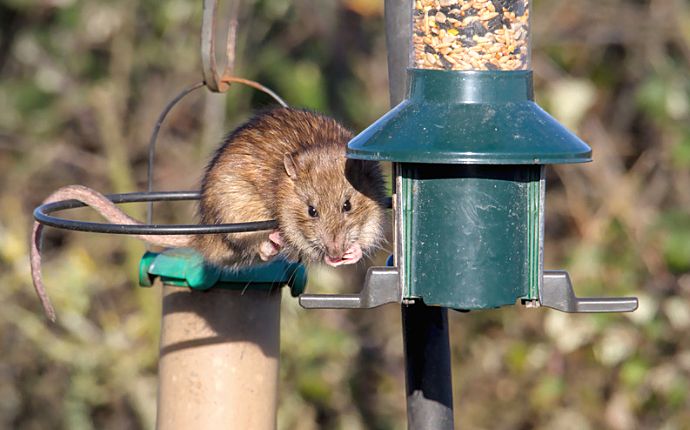Bird feeders are containers filled with birdseed placed outdoors to attract wild birds. They are excellent for bird watching and make a fun addition to any yard.
Unfortunately, pesky rats love bird feeders. They are attracted to the birdseed and enjoy snacking on this steady food source. But rats are also intelligent and resourceful. Before you know it, they will be moving into your home!
It is possible to have a bird feeder and keep your home and yard rat-free. Keep reading to learn more about rat behavior and how to keep rats away from bird feeders.
Rat Behaviors You Should Know
Understanding rat behaviors will help you understand how to keep them away from your bird feeders.
Rats are a common pest in human environments. They thrive in both rural and city areas because they eat a wide variety of foods. Rats tend to follow the same foraging path and are curious animals. They purposefully test out new items to see if it is edible for them or not.
Rats are most active at night, which is when they develop foraging paths. They are creatures of habit and tend to stick to the same routes. Rats can live alone or with others depending on the species.
Rats are also very hardy. They can fall from several stories and survive. They travel through neighborhoods along fence tops or telephone lines, often searching for food.
Interestingly, rats are clever creatures. They, like humans, avoid unpleasant experiences and seek rewards. Knowing these characteristics helps keep rats away from your property.
Why Do You Need to Keep Rats Away From Your Feeders?
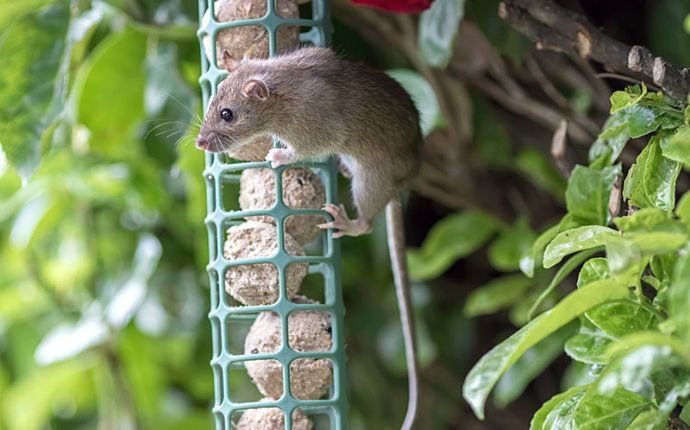
There are two main reasons you should keep rats away from your bird feeders.
The first is that they will steal all of your bird feed, leaving none for the birds. This thievery defeats the purpose of your bird feeder.
The second reason is that rats, once they become comfortable in your yard, can move into your home too. Avoid this advancement into your home at all costs. These pests pose health threats to your family and your pets.
Rats also cause structural damage to your home. They wreak physical havoc on your electrical wirings, cupboards, insulation, and drywall. With their hard and continuously growing teeth, rats chew on almost everything. Rats that burrow can also weaken your home’s foundation.
Rats can also contaminate your home’s surfaces and food products with their droppings. In this way, rats can cause adverse effects on your family’s health. Rats carry pathogens that cause diseases like bubonic plague, hantavirus, leptospirosis, salmonellosis, and tapeworms.
Keeping Rats Away From Bird Feeders: Do’s and Don’ts
There are a few tips and tricks for keeping rats away from your bird feeders.
Do’s
Thankfully, there are quite a few things you can do to keep rats away from your bird feeders.
Use a Baffle
A baffle is a device that prevents squirrels, rats, and other rodents from climbing up the pole of a bird feeder or jumping down from above onto a bird feeder. Specific baffles can be placed either below the feeder or above the feeder.
Baffles placed above the feeder are usually a large-sized, smooth plastic dome that cups over the feeder. These baffles help prevent animals from hopping onto a bird feeder from above. These baffles typically look like an inverted bowl and are hung above your bird feeder.
Baffles placed below a feeder, directly on the bird feeder pole, prevent rodents from climbing up onto the bird feeder. These are usually made of metal or plastic and come in two different shapes: large cones or torpedoes. Both are placed underneath the feeder and wrapped around the bird feeder pole.
Use a Covered Bird Feeder or Weather Guard
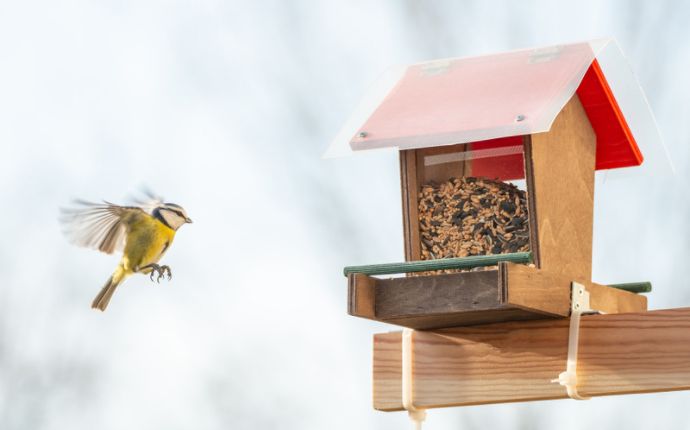
Like a feeder baffle, weather or rain guards are dome structures that protect hanging bird feeders from sun, wind, rain, and snow.
Weather guards not only keep the birds dry while eating, but they also have the additional bonus of keeping the seed in your feeder dry. This dryness is essential for preventing mold, which can be harmful to birds.
Since weather guards function similarly to baffles, you can also use them to prevent rodents from hopping onto the top of your bird feeder.
Keep the Ground Clean
Birdseed on the ground will attract rats. Stopping bird food spillage is one of the most important things you can do to prevent rats from coming to your bird feeder.
A few ways to avoid getting seed on the ground include:
- Cleaning up birdseed if you notice spillage
- Choosing no-waste bird feed
- Creating a seed catcher tray
Regular sweeping of litter is also highly recommended.
Use the Right Type of Feeder
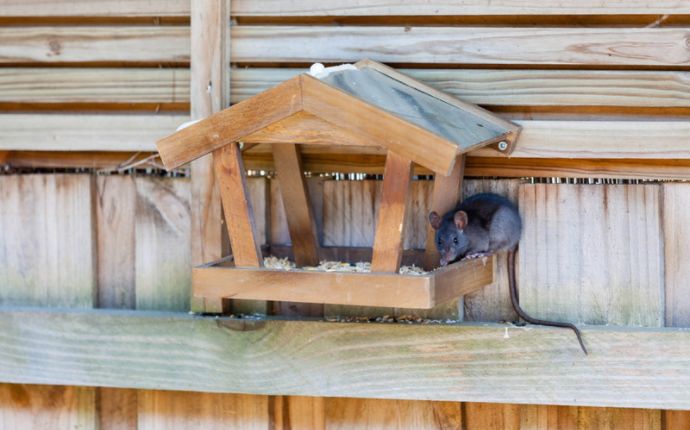
Using the correct type of feeder is critical to preventing rats from stealing your birdseed. A weight-sensitive feeder is a great tool that prevents rats, squirrels, and other rodents from eating. These feeders work by featuring a small hole that closes when a heavy weight is detected on the feeder.
Other feeders that work well to prevent rats from eating birdseed are metal or glass feeders. Metal and glass feeders tend to be more rodent-proof. Squirrels and rats cannot chew through them as easily as with plastic.
Avoid bird feeders with platform trays. It’s too easy for rats to steal the seed.
Offer Unappealing Food
Even though rats will eat almost anything, there are still types of birdseed that are less appealing to them. Some feed bends feature pepper oils. Rats hate the spiciness, but birds can’t taste it.
In addition, try to choose birdseed that does not contain a lot of grains, such as millet or sorghum, and peanuts or sunflower seeds. The husks of those fillers tend to end up on the ground and easily attract rats. Choose a high-quality brand of bird food that won’t have so many fillers.
Use Natural Rat Deterrents
There are a few natural rat deterrents you can spray or place on your feeder to deter rats. Common plant rat deterrents include citronella, eucalyptus, balsam fir, mint leaves, and sagebrush. All these plants have a strong scent that rats dislike, repelling them.
In addition to plants, rats also dislike certain spices like peppermint, cloves, cayenne pepper, and chili. The smell of these near your bird feeder will also deter rats.
Reduce Ground Cover
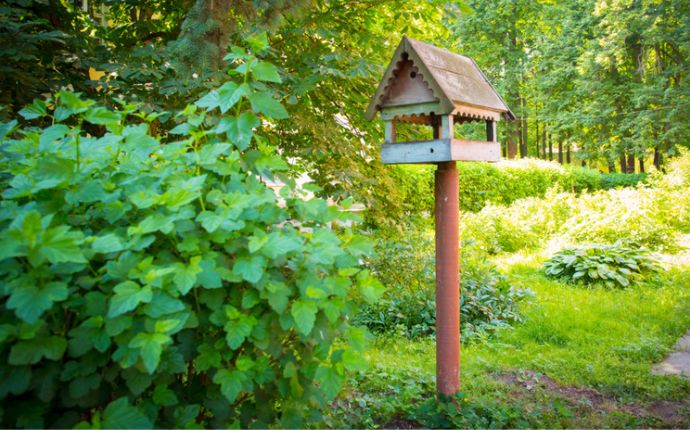
Exposing the ground under and near the feeder is another way to prevent rats from stealing birdseed. Rats dislike open areas, as they are more exposed. Open spaces don’t offer protection from birds of prey, foxes, and other predators.
Place feeders out in the open lawn, away from shrubs, trees, and other structures that could hide rats.
Set Up Rat Traps
There are multiple types of rat traps that are effective at removing rats. Traps and baits for rats include:
- Bait Boxes: These traps contain rat poisons and are easy to use and position. Ensure these are placed in areas where children or pets cannot reach them.
- Electronic Traps: Electronic traps use a high voltage shock to kill rats quickly.
- Glue Traps: Glue traps are very inexpensive and easy to use. Unfortunately, they are regarded as quite inhumane.
- Live Catch Traps: Live catch traps allow you to capture rats and then release them afterward, far away from your home.
- Snap Traps: The traditional rat trap. They are very cheap but also considered less humane. You can also harm yourself or your pets more easily using these traps.
Store Birdseed Properly
Storing your birdseed properly is vital to prevent a rat infestation. Because rats can chew through plastic containers, make sure to store birdseed in a metal container.
If possible, do not leave birdseed in your feeders overnight. Rats are nocturnal and are most active at night. Putting the seed away in a metal container at night will help prevent rats from snacking on it.
Don’ts
A few practices should be avoided when trying to keep rats away from bird feeders.
Do Not Use Platform Trays
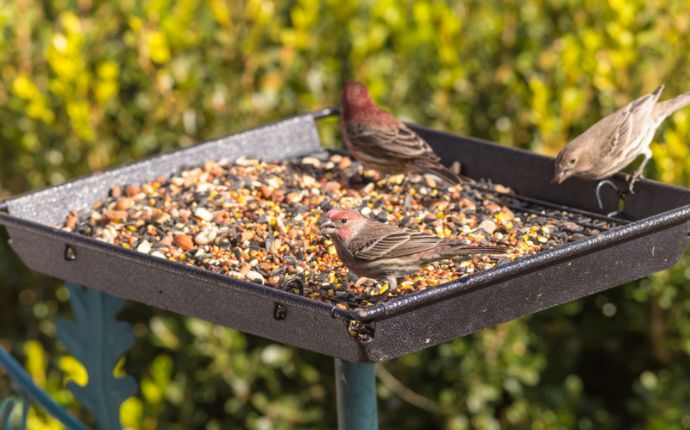
A platform tray is a non-exclusive bird feeder that consists of a simple square or rectangular platform with side pieces that help prevent birdseed from spilling over. Because platform trays are open and flat, they offer easy access to rats.
Do Not Use a PVC Pipe or Wood as a Bird Feeder Pole
Metal poles work best as they are sturdy and difficult for rats to climb. Rats can climb PVC pipe or wood bird feeder poles. Rats may also chew through a PVC or wooden pole, bringing the whole feeder crashing to the ground.
While putting petroleum jelly on your bird feeder pole to deter rats from climbing may sound like a good idea, it isn’t recommended. Consuming it may make animals sick.
Do Not Place Feeders Right Next to Your House
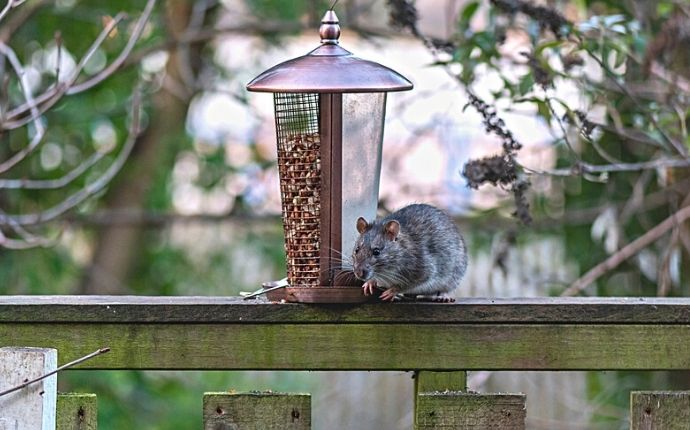
This may encourage curious rats to seek additional food sources inside your house. It is best to place bird feeders at least ten feet away from your home in a visible spot for easy bird viewing.
Do Not Overfill the Feeders
Overfilling bird feeders may cause spillage on the ground, attracting rats. It is best to fill your bird feeder just enough so that birds will consume it in a day.
To Wrap Up
Keeping rats away from your bird feeders is an essential step toward keeping them away from your home. Not only do rats cause billions of dollars in damage every year, but they can also spread disease. It is critical to rat-proof your home and make it less inviting to these unwanted pests.
When all else fails, contact your local pest control experts right away! Romney Pest Control is an award-winning, affordable pest control service provider in Dallas, Texas. We also serve Austin, San Antonio, and Houston. For the past ten years, Romney Pest Control has served commercial and residential clients with prompt and effective pest control services. Contact Romney Pest Control today for a free quote!

